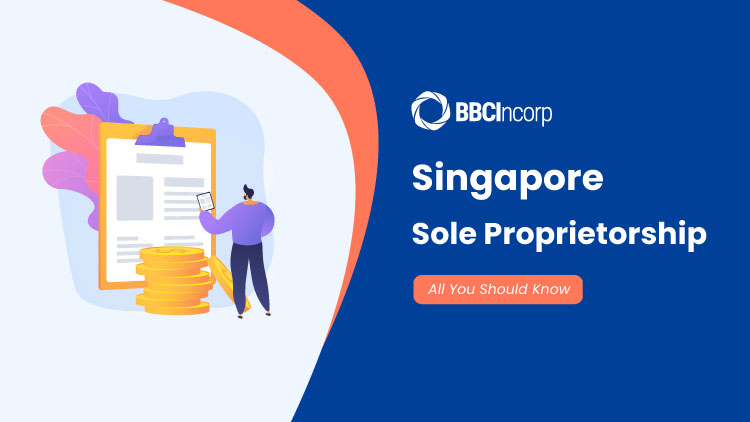
- How to define a sole proprietorship in Singapore
- Pros and cons of a sole proprietorship in Singapore
- The requirements for setting up a sole proprietorship in Singapore
- How to set up a sole proprietorship in Singapore
- Compliance requirements for a sole proprietorship in Singapore
- How to terminate a sole proprietorship in Singapore
In Singapore, a sole proprietorship is a good fit if you want to set up a small business that poses little to no risk yet can ensure profitability.
This article will provide you with everything you need to set up a sole proprietorship in Singapore.
How to define a sole proprietorship in Singapore
A sole proprietorship is a business that belongs to one owner only. And no partner allowed.
The owner, who is better referred to as a sole proprietor or a sole trader, could engage in any form of trade or provide any form of services as deemed appropriate under the law of Singapore.
At its most fundamental level, a sole proprietorship is unincorporated, pointing right to the fact that it has no legal entity, and is treated one and the same as its owner.
By the same token, the tax rate levied on a sole proprietorship is also assessed on the basis of the sole proprietor’s.
In other words, if a given sole proprietorship is owned by a legal person, it is subject to personal income tax, whose rate ranges from 0% to 22%.
Pros and cons of a sole proprietorship in Singapore
Here are some of the pros and cons of this business form that you need to consider:
Advantages
- Ease of setting up
A sole proprietorship proves to be the most simple and inexpensive business structure that one could put together
- Having absolute control
A sole proprietorship is a one-man show – the sole proprietor has absolute power over just about everything associated with his/her business provided that it is not something immoral or illegal. This might be the triggering factor for many investors to choose a sole proprietorship rather than other types of business in Singapore.
- The entitlement to all profits earned
All of the sole proprietorship’s profits would accrue to the sole proprietor.
- Few annual requirements
The sole proprietorship is relieved of the administrative burden of some formalities such as account auditing, annual reporting, and filing annual returns.
- Ease of terminating
Terminating a sole proprietorship is just as straightforward and simple as setting it up.
Disadvantages
- Unlimited liability
Since the sole proprietor is treated one and the same as his business, he/she would run the risk of being held liable for all the debts and liabilities in the event of insolvency or lawsuits.
- Lack of incentives
A sole proprietorship is excluded as a candidate for many favorable and pro-business tax incentives and treaties that are meant for an incorporated business entity.
- Limited capital
Raising capital for a sole proprietorship is practically out of the question as investors and venture capitalists usually do not have a taste for a sole proprietorship
- No perpetual succession
More often than not, a sole proprietorship is short-lived as it dies with its owner and does not allow for succession or transfer of ownership.
- Low public perception
A sole proprietorship signifies short-liveness and instability so chances are you would not be able to raise funds from venture capitalists or banks or hire competent employees.
On the surface, its cons outweigh its pros. Yet if you set out to set up a business that involves very little to no risk or that you can avoid or remedy its shortcomings in some ways, a sole proprietorship could yield significant benefits. All in all, it is well-advised that you should opt for a private limited company to enjoy many of the benefits and tax incentives that are exclusive to this business form.
The requirements for setting up a sole proprietorship in Singapore
As long as you are a legal person who is at least 18 years old and is either a Singapore Citizen, Singapore Permanent Resident (PR), or EntrePass holder, you are in the correct position to embark on a new sole proprietorship.
Foreigners who wish to set up a sole proprietorship are required to appoint at least one local authorized representative whose job is to supervise the sole proprietorship. This key individual must be a legal person who is an ordinary resident – i.e. a Singapore Citizen or a Permanent Resident. You should also take into account the minimum age requirement of this position, which is 18.
For all that, you are allowed to appoint yourself as the manager (provided that you manage to meet the criteria for this position) and be the one-man show.
One more key requirement is the amount contributed to the Medisave account given that you’re self-employed and are either a Singapore Citizen or PR, so make sure you top it up with the CPF Board before registering a sole proprietorship.
The following are all the documents required to register your sole proprietorship:
- Proposed business name
- Description of principal activities
- The local business address for the proposed business
- Copy of owner’s Singapore ID
- Local residential address of the sole proprietor
- Declaration of Compliance and Statement of Non-Disqualification
How to set up a sole proprietorship in Singapore
The registration could boil down to the following 4 steps: reserving the business name, choosing an address, appointing an authorized representative (if applicable), and registering online via BizFile.
Step 1: Reserving the business name
Registering the name for your business is rather simple. But in order to speed up the process, you should take heed of and avoid the following common mistakes in naming:
- A business name that is identical or similar to another business
- An offensive and vulgar name
- A name that is already reserved by another business
- A name that infringes other trademarks or copyrights
Step 2: Choosing a business address
The registered business address must be located in Singapore and cannot be a P.O. box address. You are allowed to use your residential address to register. If that is the case, you need to first apply for the Home Office Scheme with the Housing and Development Board (HDB).
Step 3: Appointing an authorized representative (If applicable)
If you are an ex-pat residing overseas, you will need to look for one to assume the position of authorized representative. This position can be offered to anyone who meets the following criteria:
- Is a legal person
- At least 18 years of age
- Can afford full legal capacity
- Is ordinarily resident in Singapore (i.e. has a Singapore residential address)
Step 4: Registering online through BizFile
With the help of BizFile, you are just a couple of clicks away from your sole proprietorship. If you do not have a SingPass in place, you can engage a registered filing agent to apply on your behalf so that you can be free of all the hassles.
Once you have paid the registration fee, it would generally take no more than 15 minutes to get approval.
However, if your application needs to be referred to further government agencies for approval, it may take longer, up to about 14 days or 60 days. This delay is usually due to the nature of your business – i.e. your business renders services to exceptional sectors that require referral such as finance and banking, media, educational services, etc.
Once your registration is approved, you will be notified of it via an email attached with the registration number. This notification email contains all the important details of the business that can be retrieved from BizFile.com
Compliance requirements for a sole proprietorship in Singapore
According to ACRA, the following are some key requirements when administering your sole proprietorship:
- All business communication materials such as letterheads and invoices must bear the registration number
- Notify changes of business registered particulars to ACRA
- Business registration is only valid for 1 to 3 years and needs to be renewed before the expiry date.
- A sole proprietorship is exempted from filing an annual return together with financial statements with ACRA
- However, the personal income tax returns must be submitted yearly with IRAS.
Free ebook
Key matters for doing business in Singapore
Get all the details for doing business in Singapore with our guide

How to terminate a sole proprietorship in Singapore
If your sole proprietorship sees a downturn and you believe attempting to save it is to no avail, you could terminate it.
First and foremost, you need to see to it whether or not your business is GST-registered, if yes, you might well apply for cancellation.
You can easily exercise your right to terminate the sole proprietorship by advising ACRA of your intention. You can do this online by filling out the “Cessation of Business” online via BizFile+ using SingPass or CorpPass. This must be done by you – the owner of the business, or the authorized representative.
As soon as you click submit, the sole proprietorship is officially terminated.
Should you have any questions as to how to register a company in Singapore, drop us a chat message or send us an email via service@bbcincorp.com. We are ready to assist you!
Disclaimer: While BBCIncorp strives to make the information on this website as timely and accurate as possible, the information itself is for reference purposes only. You should not substitute the information provided in this article for competent legal advice. Feel free to contact BBCIncorp’s customer services for advice on your specific cases.
- How to define a sole proprietorship in Singapore
- Pros and cons of a sole proprietorship in Singapore
- The requirements for setting up a sole proprietorship in Singapore
- How to set up a sole proprietorship in Singapore
- Compliance requirements for a sole proprietorship in Singapore
- How to terminate a sole proprietorship in Singapore
Industry News & Insights
Get helpful tips and info from our newsletter!
Stay in the know and be empowered with our strategic how-tos, resources, and guidelines.





